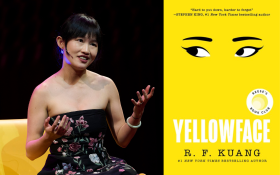Lists, they’re everywhere this month. The International Man Booker has announced its toweringly impressive shortlist of fifteen. The Orange Prize for fiction and the Carnegie Medal have both announced their shortlists, with the Carnegie also making a top ten selection of the best books to have been granted the award since it started in 1936. Waterstone’s asked their 5,000 employees to name their favourite 5 books to have been published since 1982, when their first stores opened, and have created a list of the top 100. Everywhere people are humming and hah-ing over who should make it and who shouldn’t.
There is no doubt that all this ranking and rating inspires debate. Most markedly, the issue of women writers and their place within the modern arena has been highlighted. Why, of the top 100 books chosen by Waterstone’s, are only 22 by women? Why, when the playing field is supposedly level, does the Orange Prize still need to limit itself to female writers? These are questions that evade definitive answers. Creating the critical arena in which they are posed, however, is one reason why literary awards are so valuable to the publishing community.
Literary awards go far beyond satisfying the human desire to identify the best in any field. As well as highlighting trends they create an opportunity for championing high-quality writing that might otherwise be overlooked. In this industry, where the size of a promotional budget has a greater influence over book sales than literary merit or powerful plot, awards present an equalising opportunity. Here the strength of the writing outweighs the financial dominance of the publisher.
The Booker, for example, was won by two independent publishers successively, Canongate, with Yann Martel’s Life of Pi in 2002 and Faber, with DBC Pierre’s Vernon God Little in 2003. In fact, Faber has not missed a Booker shortlist since 1998. And this year the Costa Prize winner, The Tenderness of Wolves, came from start-up company, Quercus.
Quercus attribute much of their success to their involvement in the consortium, The Independent Alliance. The consortium combines the sales and marketing efforts of seven small publishers, including Faber, Canongate and Profile to achieve the sort of competitive scale essential to push titles into the front of bookstores. ‘Without the alliance we never would have had the reach or visibility for [The Tenderness of Wolves] that we had before the award,’ said Mark Smith, Quercus’s CEO.
The comment hints at the importance of prominence for a title before it even makes it into the running for a literary award. The judges are experts in the field, and I’m sure they do their best to seek out the under-represented, but even they have only the tools of bookstores and the media in order to identify their potential winners.
Mark Smith’s comment also points to the immense sales boost generated when a title does win an award. Winning the Booker, for example, virtually guarantees best-seller status. The God of Small Things, the 1997 winner, The English Patient, the winner in 1992 and Schindler’s Arc, the 1982 winner, all went on to sell over a million copies. And more obscure winner of 1999, JM Coetze’s Disgrace, jumped from 1431 on the sales list to just sixth.
Harvey McGrath, chairman of the Man group, which sponsors the International Booker, says of the award: ‘We believe the value of this unique prize, which recognises writers of all the nations of the world, is in its contribution to encouraging more reading of and debate about contemporary fiction.’
The runners of the awards are certainly achieving their aim of getting books into readers’ hands. But looking again at those sales figures, the question is, do they simply get the same book into all readers’ hands?
Literary prizes are, as Kathryn Hughes, author, and regular judge of literary awards, comments, ‘a very blunt instrument. Judges will never get it “right”,’ she goes on to say, ‘because there is no such thing as an objective judgment about which book is “best”. All one can hope for, really, is that in the process of drawing up the long- and shortlists the judges will have scooped up a goodish proportion of goodish books out of which they pick a winner which is, well, goodish.’
We all watch the drafting of these lists with anticipation. We watch a few people read a lot of books. Finally we rush out to buy the single book they have judged to be ‘the best’. In this area, as in so many areas of the publishing industry, only the superlative is celebrated.
One of the best things about literature, now and over the ages, is its variety. And that’s why my favourite amongst all the lists of the last few weeks is the shortlist for the Bookseller/Diagram prize for oddest title. This year, Stray Shopping Carts of Eastern North America beat Tattooed Mountain Women, and Better Never to Have Been: The Harm of Coming into Existence to the top spot. This is a prize that categorises only by the unusual and represents the true diversity of literature, something the publishing world is in danger of forgetting to value.




